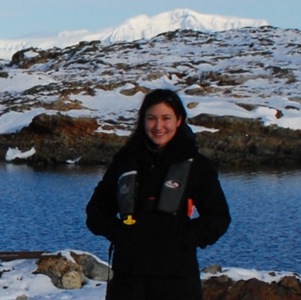Regina Clewlow: Difference between revisions
From Santa Fe Institute Events Wiki
No edit summary |
No edit summary |
||
| (One intermediate revision by the same user not shown) | |||
| Line 1: | Line 1: | ||
[[image: ReginaClewlow.jpg]] | [[image: ReginaClewlow.jpg|left]] | ||
Regina Clewlow | Regina Clewlow started her PhD in the [http://esd.mit.edu Engineering Systems Division (ESD)] at MIT in September 2008. Funded through an [http://web.mit.edu/mitei/ Energy Fellowship], she returned to graduate school in order to address the challenges of growing global energy consumption and climate change impacts. | ||
Prior to | Prior to starting her PhD, Regina served as the Founding Executive Director of Engineers for a Sustainable World (ESW), a non-profit organization that is dedicated to infusing sustainability into engineering education and practice. At ESW, Regina coordinated national and international workshops bringing together educators, students, and private sector partners to explore opportunities to integrate sustainability into research and education. Funded by UNESCO and the National Science Foundation, ESW grew to over 30 colleges campuses around the world and resulted in the creation of new sustainable engineering courses and academic programs. | ||
Regina's PhD research is linked to the Partnership for AiR Transportation Noise and Emissions Reduction ([http://web.mit.edu/aeroastro/partner PARTNER]) center and [http://globalchange.mit.edu/ MIT Joint Program on the Science and Policy of Global Change]. Her current work is focused on reducing surface emissions of air transportation (e.g. excessive taxiing at airports), and involves quantitative analysis of contributions to taxi delays, as well as survey work to determine current operational practices and attitudes towards fuel-conservation strategies. Her future work will primarily focus on analyzing the aviation sector's impact on climate change, through the [http://globalchange.mit.edu/igsm/eppa.html MIT Emissions Prediction and Policy Analysis (EPPA) Model], built into the larger [http://globalchange.mit.edu/igsm/index.html MIT Integrated Global System Model]. Her broader research interests include sustainable transportation planning, multi-mode transportation analysis, environmental policy, and travel behavior. | |||
Regina received her B.S. in Computer Science and M.E. in Civil & Environmental Engineering from the Cornell University College of Engineering. | Regina received her B.S. in Computer Science and M.E. in Civil & Environmental Engineering from the Cornell University College of Engineering. | ||
More information about Regina is available on her [http://web.mit.edu/rclewlow/www website]. | More information about Regina is available on her [http://web.mit.edu/rclewlow/www personal website]. | ||
Latest revision as of 14:51, 21 July 2009

Regina Clewlow started her PhD in the Engineering Systems Division (ESD) at MIT in September 2008. Funded through an Energy Fellowship, she returned to graduate school in order to address the challenges of growing global energy consumption and climate change impacts.
Prior to starting her PhD, Regina served as the Founding Executive Director of Engineers for a Sustainable World (ESW), a non-profit organization that is dedicated to infusing sustainability into engineering education and practice. At ESW, Regina coordinated national and international workshops bringing together educators, students, and private sector partners to explore opportunities to integrate sustainability into research and education. Funded by UNESCO and the National Science Foundation, ESW grew to over 30 colleges campuses around the world and resulted in the creation of new sustainable engineering courses and academic programs.
Regina's PhD research is linked to the Partnership for AiR Transportation Noise and Emissions Reduction (PARTNER) center and MIT Joint Program on the Science and Policy of Global Change. Her current work is focused on reducing surface emissions of air transportation (e.g. excessive taxiing at airports), and involves quantitative analysis of contributions to taxi delays, as well as survey work to determine current operational practices and attitudes towards fuel-conservation strategies. Her future work will primarily focus on analyzing the aviation sector's impact on climate change, through the MIT Emissions Prediction and Policy Analysis (EPPA) Model, built into the larger MIT Integrated Global System Model. Her broader research interests include sustainable transportation planning, multi-mode transportation analysis, environmental policy, and travel behavior.
Regina received her B.S. in Computer Science and M.E. in Civil & Environmental Engineering from the Cornell University College of Engineering.
More information about Regina is available on her personal website.
